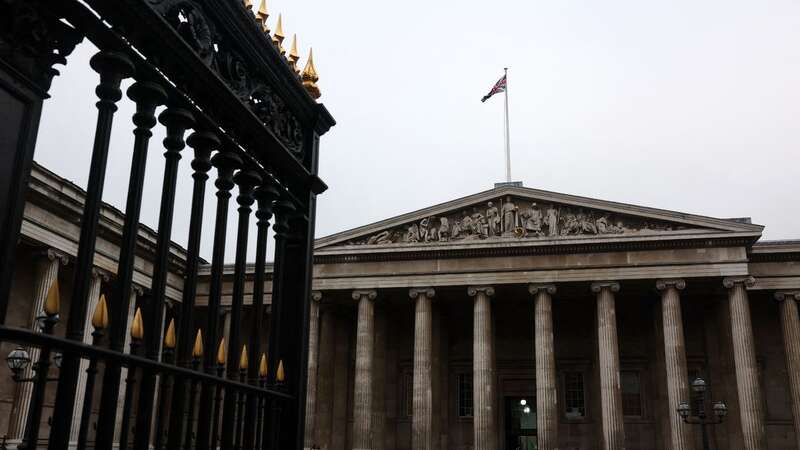
The FBI has aunched an investigation of what are believed to be hundreds of treasures from the British Museum to US buyers.
The US law enforcement agency has also helped in the return of 268 items that were sold to a collector in Washington DC. Last year, the British Museum announced that ancient gems, jewellery and other items from its collection were missing, stolen or damaged.
A buyer based in New Orleans said that an FBI agent had emailed him requesting information about two pieces he had purchased on eBay. An FBI agent told the BBC they were assisting the Metropolitan Police with investigating missing or stolen items from the museum.
READ MORE: British Museum 'thief' is curator of 35 years 'who put priceless items on eBay'
 Peter Higgs, an eminent expert on antiquities, was sacked from the British Museum over the missing items
Peter Higgs, an eminent expert on antiquities, was sacked from the British Museum over the missing itemsThe buyer has said he no longer possesses either gem and does not believe they have been found by authorities. The British Museum estimates that out of 1,500 items it believes are stolen or missing, 626 have so far been recovered and 100 more have been found but not yet returned.
 Gangsters ‘call for ceasefire’ after deadly Christmas Eve pub shooting
Gangsters ‘call for ceasefire’ after deadly Christmas Eve pub shooting
The majority of items the museum believes to have been stolen were uncatalogued and it is still trying to find ways to prove they come from its collection. In some cases, this involves collectors agreeing to donate items to the museum for staff assessment.
Peter Higgs, a senior curator, is accused by the British Museum of stealing, damaging, melting down, and selling ancient artefacts. He denies the allegations.
 Peter Higgs (L) with one of the museum's treasures (PA)
Peter Higgs (L) with one of the museum's treasures (PA)The museum has accused Dr Higgs of pocketing an estimated £100,000 in total. Court documents reveal that the museum, which is suing Dr Higgs, alleges he pilfered items for over a decade, mainly selling unregistered pieces from the storerooms.
It's claimed that Dr Higgs, now dismissed, flogged these items to at least 45 buyers on eBay. He is currently defending himself against the civil claim.
To date, no arrests or charges have been made in connection with the case. Three purchasers identified the seller "sultan1966" as presenting himself as either "Paul Higgins" or simply "Paul" on eBay or via email.
The museum asserts in court filings that Dr Higgs confessed the eBay account sultan1966 was his. Tonio Birbiglia from New Orleans told the BBC he purchased two items from sultan1966.
 The museum has a massive collection of antiquities (Getty Images)
The museum has a massive collection of antiquities (Getty Images)One item, bought by Mr Birbiglia for £42 in May 2016, features an amethyst gem depicting Cupid, the Roman god of love, riding a dolphin. The other purchase was an orange scarab-beetle gem costing £170, paid to a PayPal account linked to Dr Higgs' personal email.
Mr Birbiglia, who was employed at an antiquities gallery at the time, expressed his shock when he was contacted by the FBI. He suggested that he might have purchased the gems with the intention of reselling them, adding "I can't even remember any of it".
Mr Birbiglia informed the special agent that he had no recollection of the gems. He requested more information from the FBI, such as photographs, to help him identify their possible whereabouts.
The FBI has also been involved in investigating 268 items in the Washington DC area sold by the same seller. A source close to the buyer informed the BBC that he purchased items from sultan1966 on eBay and later dealt directly with the same seller via email, paying up to £7,000 for the items.
 Four human skulls wrapped in tin foil found in package going from Mexico to US
Four human skulls wrapped in tin foil found in package going from Mexico to US
 The FBI are now helping with investigations (Getty Images/iStockphoto)
The FBI are now helping with investigations (Getty Images/iStockphoto)The source revealed that the seller used the alias "Paul Higgins" during the transactions. Dr Ittai Gradel, a Danish antiquities dealer who first alerted the museum to the thefts, has managed to track down artefacts that were sold to buyers in several cities including Hamburg, Cologne, Paris and Hong Kong.
Some of the gems he bought himself in good faith, which he later sold to another private collector, ended up on display at the Deutsches Edelsteinmuseum in Idar-Oberstein, Germany. One gem is believed to be a rare 2nd Century head of the Greek hero Hercules made from obsidian, a type of volcanic glass.
The gem, estimated to be worth thousands of pounds, was one of the prize exhibits and featured as a full-page photograph at the start of the exhibition's catalogue. In 2017, Dr Gradel paid £300 for the item, which was offered in a private deal under the alias used by Dr Higgs - Paul Higgins.
Read more similar news:
Comments:
comments powered by Disqus































